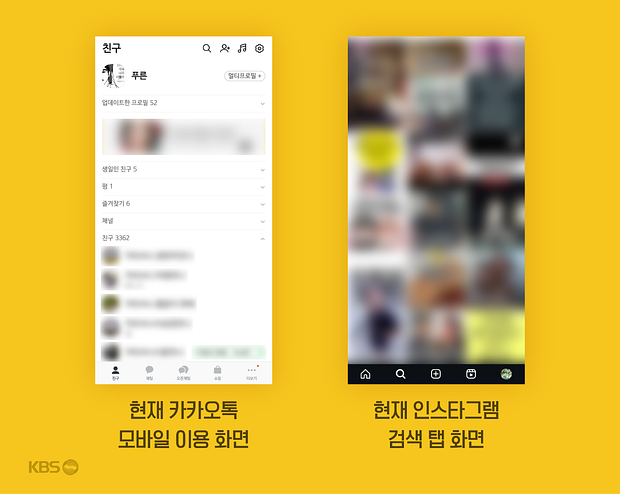
SEOUL — KakaoTalk, South Korea's ubiquitous "National Messenger," is facing a fierce backlash from users following a major interface overhaul—the most significant in its 15-year history. The controversial changes, intended to transform the app into a content-driven 'Super App,' have sparked widespread user revolt, driving the company's stock price down to the 50,000 won range.
The uproar began immediately after the phased rollout of the updated app, which commenced on September 23rd. Online communities and social media platforms are now flooded with scathing critiques, with comments ranging from "Worst update ever" and "Revert the app to its previous version" to sharing methods to circumvent the automatic update. Some users are even discussing migrating to rival messengers like Line and Telegram.
The Instagram-Style Interface Backlash
The primary source of user discontent is the revamped Friends Tab, which has abandoned its traditional phonebook-style contact list in favor of a 'feed-type' main screen. This new format prominently displays friends' profile updates, including photos, videos, and status messages, in a manner highly similar to platforms like Instagram.
Users argue that the change fundamentally undermines KakaoTalk's core function as a simple, efficient messenger. One user, identified as Mr. A (36), expressed his frustration, stating, "I'm not curious about what profile picture my barely-close co-worker has changed or what status message they've posted. Now, I have to click an extra button just to see the actual friend list, and there are too many ads squeezed in between the feeds."
For a nation where KakaoTalk is deeply integrated into daily life, used for everything from personal chats to work communication, many feel the new 'social media' direction is an unwelcome intrusion. While some positive features, such as message editing and chatroom categorization, have been rolled out, the non-messaging-related design shift has overshadowed any improvements.
The 'Super App' Strategy and User Resistance
Kakao's motivation for the drastic overhaul is clear: to boost user engagement and transform the app from a simple messaging service into a comprehensive Super App—a single platform offering diverse services, including short-form content and integration with generative AI like ChatGPT. This strategic shift is aimed at increasing the time users spend in the app and leveraging a content monetization ecosystem.
However, the resistance underscores a critical challenge for Kakao: its status as the 'national messenger' is also its Achilles' heel. While users are sharing 'escape methods' to block the update and posting reviews about switching to competitors, the reality is that finding a viable alternative is difficult for most. As user B (34) pointed out, "Even if I don't want to use it, a messenger isn't something you can switch alone."
Kakao's Response and Market Reaction
Kakao management is reportedly "closely monitoring the situation." Jung Shin-a, CEO of Kakao, acknowledged the friction, saying, "This change may be unfamiliar to some. Even a font change can draw negative feedback temporarily. However, we aim to evolve into a better platform by actively listening to user feedback."
Despite the promise of future improvements, the immediate market reaction has been brutal. Negative sentiment over the large-scale revamp has coincided with a continuous slump in Kakao's stock price. On the day of this report, the stock closed at 59,300 won, a drop of 6.17% from the previous day, bringing it down to the 50,000 won range—a significant decline from its 68,500 won price just a week prior.
The coming weeks will be crucial as Kakao attempts to balance its strategic ambition of becoming an AI-powered Super App with the expectations of a user base accustomed to the app's long-standing, straightforward utility. Will Kakao successfully navigate this period of intense criticism, or will the backlash permanently alienate its loyal users?
[Copyright (c) Global Economic Times. All Rights Reserved.]




























